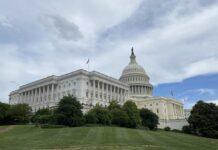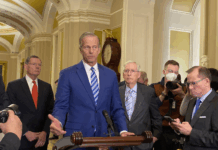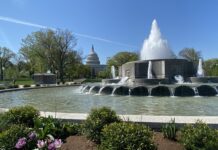Habersham State Senator John Wilkinson says raising the tax on gasoline wasn’t the easy thing to do, it was the necessary thing to do. He says HB 170, which replaces Georgia’s current mix of state sales and excise taxes on gas with a single 26 cent excise tax, could be a matter of life or death for drivers on some of the state’s deteriorating roads and bridges.
The new law, passed earlier this week, also imposes a $200 tax on people with electric cars and creates a new $5 per night tax on hotel and motel rooms. Governor Nathan Deal indicates that he will sign the bill.
Sen. Wilkinson provided the following report to Now Habersham.

Georgia’s 153rd Legislative Session came to an end just after midnight on Thursday, April 2nd. Many important pieces of legislation were passed during the 40 days we were in session, and some that were not passed will be studied and brought back up for consideration in 2016. Our state’s economy continues to improve from the recession and that makes our budgetary decisions a little easier. Instead of the cuts we were faced with for several years, we have been able to restore some funding where it is needed most.
As Chairman of the Senate Agriculture and Consumer Affairs Committee and Vice Chairman of the Senate Education and Youth Committee, much of my time was focused on these two important areas. It was a good year for agriculture and education. This is important since agriculture is our state’s biggest business and education is our most important tool in economic development.
As a member of the Senate Appropriations Committee, I am particularly pleased that we were able to add $820,000 to the budget for planning and design for a manufacturing facility on the Clarkesville campus of North Georgia Technical College. This facility will be an important tool for all of Northeast Georgia as we recruit manufacturing firms in the future. Well trained and educated workers give us a “leg up” as we compete for new industry.
In our K-12 budget, we were able to add $280 million in additional funds to offset austerity reduction, eliminate furlough days, increase instructional days, or provide salary increases to teachers. A 3% increase for the HOPE Scholarship and other related scholarships was also added in the new budget.
Another significant piece of legislation was HB 91. This bill eliminates the high school graduation test requirement, and it will allow more than 8,000 Georgians to have the ability to receive their diploma. This will give many deserving individuals in our state a second chance for career and educational opportunities.
We were also able to provide additional funding for extension agents, Young Farmer teachers, agriculture teachers and the FFA/FCCLA Center. All of this is important to our state and to Northeast Georgia in particular.
HB170, known as the Transportation Bill, was passed on day 39. The bill was the result of the work of a number of groups and individuals. Before the session began in January, a study committee held hearings for several months all across the state. During the hearings, it became obvious that if Georgia was to maintain its role as a national leader in business, more revenue would be required for transportation.
Many roads and bridges across our state are deteriorating. There are bridges in our state that are unsafe for trucks and school buses. Many school buses around the state drive many extra miles every day, because the most direct route has an unsafe bridge. We cannot afford to put our children and grandchildren’s’ lives at risk. The extra miles cost us in safety, time, and money.
HB 170, as originally introduced, would have negatively impacted local governments and school systems. We worked to amend it in the conference committee so that the final version does not. It does raise an additional 1 billion dollars annually for transportation in our state.
When the previous gas tax was imposed in 1971, taking into consideration the cost of gasoline at that time, the 7.5 cent-per-gallon tax cost the consumer an average of 21 percent of the cost of a gallon of gas, and this bill is well below that percentage. The 4 per cent sales tax on gasoline and 7.5 cent-per-gallon excise tax on motor fuel was eliminated to make room for an excise tax of 26 cents-per-gallon on gasoline and 29 cents-per-gallon on diesel.
We also generated revenue by eliminating tax breaks for some commercial air carriers and electric vehicles, and imposing fees on some lodging. Hopefully, this is a fair way for everyone to share the burden and make our transportation system safe and efficient for many years to come.
Finally, HB 1, known as the medical cannabis bill, passed both houses and was signed by the Governor. I supported this bill and I believe the children and families suffering deserve the relief it affords them. We also passed a bill to insure autistic children would have insurance early on to provide the help they need. Both of these bills are investments in our future.






